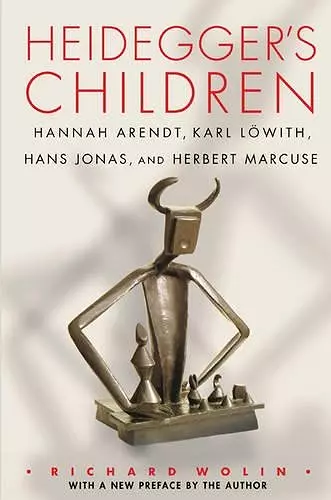Heidegger's Children
Hannah Arendt, Karl Löwith, Hans Jonas, and Herbert Marcuse
Format:Paperback
Publisher:Princeton University Press
Published:2nd Oct '15
Currently unavailable, and unfortunately no date known when it will be back

Martin Heidegger is perhaps the twentieth century's greatest philosopher, and his work stimulated much that is original and compelling in modern thought. A seductive classroom presence, he attracted Germany's brightest young intellects during the 1920s. Many were Jews, who ultimately would have to reconcile their philosophical and, often, personal commitments to Heidegger with his nefarious political views. In 1933, Heidegger cast his lot with National Socialism. He squelched the careers of Jewish students and denounced fellow professors whom he considered insufficiently radical. For years, he signed letters and opened lectures with "Heil Hitler!" He paid dues to the Nazi party until the bitter end. Equally problematic for his former students were his sordid efforts to make existential thought serviceable to Nazi ends and his failure to ever renounce these actions. This book explores how four of Heidegger's most influential Jewish students came to grips with his Nazi association and how it affected their thinking. Hannah Arendt, who was Heidegger's lover as well as his student, went on to become one of the century's greatest political thinkers. Karl Lowith returned to Germany in 1953 and quickly became one of its leading philosophers. Hans Jonas grew famous as Germany's premier philosopher of environmentalism. Herbert Marcuse gained celebrity as a Frankfurt School intellectual and mentor to the New Left. Why did these brilliant minds fail to see what was in Heidegger's heart and Germany's future? How would they, after the war, reappraise Germany's intellectual traditions? Could they salvage aspects of Heidegger's thought? Would their philosophy reflect or completely reject their early studies? Could these Heideggerians forgive, or even try to understand, the betrayal of the man they so admired? Heidegger's Children locates these paradoxes in the wider cruel irony that European Jews experienced their greatest calamity immediately following their fullest assimilation. And it finds in their responses answers to questions about the nature of existential disillusionment and the juncture between politics and ideas.
"Provocative and erudite... [Wolin] provide[s] insightful portraits of the intellectual evolution of some of the last century's most ambitious political and social thinkers. His case against Heidegger's children sets a clear standard for those who wish to adopt an informed but cautious stance toward Heidegger's immense influence."--James Ryerson, New York Times Book Review "Anyone tempted to introduce Heidegger into the conversation should read this fascinating study."--Lesley Chamberlain, Independent "A thought-provoking and illuminating look at Heidegger's legacy... Wolin's thesis grasps the profound and pervasive connection between Heidegger's thinking and the Holocaust itself."--Choice
ISBN: 9780691168616
Dimensions: unknown
Weight: 454g
320 pages